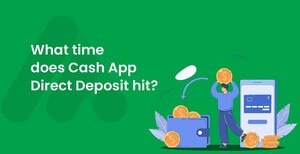Cash App Direct Deposit vs. Traditional Banking: A Comprehensive Comparison
Body
In today's fast-paced world, the way we handle financial transactions is evolving rapidly, thanks to the emergence of innovative financial technology solutions. Among these solutions, Cash App has gained significant traction, offering a seamless platform for peer-to-peer payments. A standout feature of Cash App is its direct deposit service, which challenges traditional banking methods. In this article, we'll conduct a comprehensive comparison between Cash App direct deposit and traditional banking, examining the advantages and disadvantages of each.
1. Accessibility and Speed: Cash App's direct deposit excels in providing instant accessibility to funds. As soon as a direct deposit is processed, the funds become available in the user's Cash App account, providing immediate access for transactions. Traditional banking, on the other hand, may involve waiting for checks to clear or waiting for interbank transfers to process, leading to delays in accessing funds. This speed advantage of Cash App can be especially beneficial for users who require quick access to their money for emergencies or time-sensitive opportunities.
2. Paperless and Environmentally Friendly: Cash App's digital approach eliminates the need for paper checks, contributing to a paperless and environmentally friendly financial ecosystem. In contrast, traditional banking often relies on physical checks, leading to the consumption of paper and other resources. By embracing Cash App's paperless direct deposit, users can actively support sustainability efforts and reduce their environmental footprint.
3. Financial Management Tools: Cash App provides users with a user-friendly interface that allows them to track their transactions, categorize expenses, and set budgeting goals. This transparency in financial management helps users make informed decisions and maintain better control over their finances. While some traditional banks offer financial management tools, they may not be as intuitive or seamlessly integrated as the features provided by Cash App.
4. Early Direct Deposit Advantage: Cash App's early direct deposit feature can be a game-changer for users living paycheck to paycheck or facing unexpected expenses. Depending on the employer's policies, users may receive their funds a day or two earlier than their official payday. Traditional banks typically follow standard payday schedules, limiting the flexibility of accessing funds ahead of time. This early direct deposit advantage of Cash App can provide valuable breathing room for users facing financial constraints.
5. Security and Trust: Both Cash App and traditional banks prioritize the security of their users' financial data. Cash App implements advanced encryption and authentication measures to safeguard transactions and account information. Traditional banks also adhere to industry-standard security protocols to protect customer data.
While both options are considered secure, users may place more trust in traditional banks due to their longstanding presence and established reputation in the financial industry. However, Cash App has made significant strides in building trust among its user base through its transparent approach and proactive security measures.
6. Integration with Physical Banking Services: Traditional banks often offer a wide range of physical banking services, such as in-branch support, access to ATMs, and more extensive financial product offerings, including mortgages and loans. Cash App, being primarily a digital platform, may not offer the same level of physical presence or diverse product offerings as traditional banks.
7. Transaction Fees and Limitations: Transaction fees and limitations may vary between Cash App and traditional banks. Cash App may charge fees for certain transactions, such as instant transfers or ATM withdrawals, while traditional banks may also have their own fee structures.
It's essential for users to carefully review the fees and limitations associated with each option to determine which best aligns with their financial needs and usage patterns.
Conclusion: Cash App direct deposit and traditional banking each offer unique advantages and considerations for users. While Cash App's direct deposit provides instant accessibility, a paperless approach, and early direct deposit benefits, traditional banking may offer a more extensive range of physical services and financial product offerings.
Ultimately, the choice between Cash App direct deposit and traditional banking depends on individual preferences, financial goals, and comfort levels with digital transactions. Some users may find value in embracing the speed and convenience of Cash App direct deposit, while others may prefer the familiarity and physical presence of traditional banks.
Regardless of the choice, the increasing prevalence of financial technology solutions like Cash App highlights the growing demand for efficient, secure, and user-centric financial services. As the financial landscape continues to evolve, users can explore these options to find the best fit for their financial needs and embrace the advantages of modern financial technology.













Comments